Gerrick Wilkins survives attempted candidate challenge
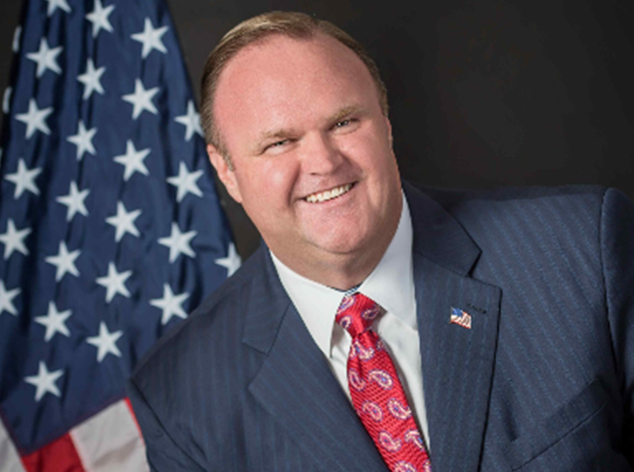
The Alabama Republican Party candidates committee met on Sunday to hear challenges to candidates on the GOP ballot. Sources say that there was a challenge brought against the candidacy of Gerrick Wilkins. Wilkins is running for Alabama’s Sixth Congressional District. Wilkins has been charged with making a contribution to the Libertarian party. A search of the Federal Elections Commission website revealed that Wilkins had donated $250 to the Libertarian National Committee on September 5, 2022. Most of Wilkins’ contributions are to Republican candidates and causes. Wilkins has made numerous political contributions over the years, including to the Alabama Republican Party, Donald Trump for President in 2024, Tim Scott for President, Ron DeSantis for President, John McCain for President in 2008, Fred Thompson for President, and the Republican Party of Florida. The Alabama Republican Party State Executive Committee made a bylaws change in 2022 to forbid a person who donates to Democratic, independent, and third-party candidates from running as a Republican. Wilkins’s contribution to the Libertarian Party was after this prohibition was placed on supporting non-Republican campaigns. People who have donated to non-Republican campaigns and groups are barred from running for office as a Republican for five years. Sources close to the ALGOP told Alabama Today that the candidate’s committee would meet in Birmingham on Sunday to hear the challenge against Wilkins. The committee reportedly voted 9 to 8 not to formally challenge Wilkins’ eligibility to run as a Republican. Election challenges will be heard on December 10. The Wilkins campaign dismissed the allegations, saying that he has far more donations to Republican candidates than he did to Libertarians. A source close to ALGOP told Alabama Today that the bylaw prevents potential candidates from donating to non-Republican candidates. Wilkins did not do that. He actually donated to the Libertarian Party. That is not forbidden in the new bylaws change. The ALGOP candidates committee is the 21-member Alabama Republican Party Steering Committee. Wilkins’ victory in the closed-door GOP meeting in Hoover means he can remain on the ballot. Wilkins, a car dealer, will face incumbent Congressman Gary Palmer (R-Hoover) and independent insurance agent Ken McFeeters in the March 5 Republican Primary. The eventual Republican nominee will face Democrat Elizabeth Anderson in the November 5 general election. To connect with the author of this story or to comment, email brandonmreporter@gmail.com.
Joe Biden awards Medal of Freedom to Fred Gray, John McCain, Gabby Giffords

President Joe Biden on Thursday presented the nation’s highest civilian honor, the Presidential Medal of Freedom, to 17 people, including gymnast Simone Biles, the late John McCain, the Arizona Republican whom Biden served with in the Senate, and gun-control advocate Gabby Giffords. “Today, she adds to her medal count,” Biden said as he introduced Biles, a former foster child whose 32 Olympic and World Championship medals make her the most decorated U.S. gymnast in history. “I don’t know how you’re going to find room,” for another medal, Biden joked. The 25-year-old is an advocate for athletes’ mental health, foster care children, and sexual assault victims. She’s also the youngest person to ever receive the medal, Biden said. The Democratic president, who took office at a critical point during the coronavirus pandemic, also honored Sandra Lindsay, the Queens, New York, nurse who was the first person to be vaccinated against COVID-19 outside of clinical trials during a live television appearance in December 2020. It was the first time Biden had awarded the Presidential Medal of Freedom. His recipient list included both living and deceased honorees, some of them representing various stages of the president’s life, from the Catholic nuns who taught him as a boy growing up in Claymont, Delaware, to Republican lawmakers he served with in the Senate to a college professor like his wife, Jill, to advocates of tightening access to firearms. Biden introduced Giffords as “one of the most courageous people I have ever known.” The former Arizona congresswoman founded the organization named Giffords to campaign for an end to gun violence and restrictions on access to guns. The Democrat almost died after she was shot in the head in January 2011 during a constituent event in Tucson. Biden noted that he recently signed the most sweeping gun-control legislation in decades — though he and others would like even more restrictions — and credited Giffords and families like her own whose lives have been altered by gun violence for helping to make it happen. “She’s the embodiment of a single signature American trait: never, ever give up,” Biden said. Biden also recognized former Republican Sens. Alan Simpson of Wyoming and John McCain of Arizona, recalling a less partisan era of Washington in which members of different parties would argue over issues during the day and then meet over dinner at night. McCain died of brain cancer in 2018. He spent more than five years in captivity in Vietnam while serving in the U.S. Navy. He later represented Arizona in the House and Senate and was the 2008 Republican presidential nominee, competing against Democrats Barack Obama and Biden. Biden said he didn’t appreciate the political competition, but “I never stopped admiring John … I knew his honor, his courage, and commitment.” The 17 people receiving honors “have overcome significant obstacles to achieve impressive accomplishments in the arts and sciences, dedicated their lives to advocating for the most vulnerable among us, and acted with bravery to drive change in their communities, and across the world, while blazing trails for generations to come,” the White House said. Biden himself knows what it’s like to receive the medal. Then-President Obama honored Biden’s decades of public service by awarding him a Presidential Medal of Freedom “with distinction” during a ceremony shortly before they left office in January 2017. Biden closed the ceremony by declaring, “This is America.” The other 13 medal recipients are: — Sister Simone Campbell, a member of the Sister of Social Service and a former executive director of NETWORK, a Catholic social justice organization. — Julieta Garcia, a former president of the University of Texas at Brownsville. Garcia was the first Latina to become a college president, the White House said. — Fred Gray, one of the first Black members of the Alabama Legislature after Reconstruction. He was a prominent civil rights attorney who represented Rosa Parks, the NAACP, and Martin Luther King Jr. and, at age 91, continues to practice law. — Steve Jobs, the co-founder, chief executive and chair of Apple Inc. He died in 2011. — Father Alexander Karloutsos, the assistant to Archbishop Demetrios of America. Karloutsos has counseled several U.S. presidents, the White House said. Biden said he is “one of my dear friends.”ADVERTISEMENT — Khizr Khan, an immigrant from Pakistan, Khan’s Army officer son was killed in Iraq. Khan gained national prominence, and became a target of Donald Trump’s wrath, after speaking at the 2016 Democratic National Convention. — Diane Nash, a founding member of the Student Nonviolent Coordinating Committee who organized some of the most important 20th-century civil rights campaigns and worked with King. — Megan Rapinoe. The Olympic gold medalist and two-time Women’s World Cup soccer champion captains the OL Reign in the National Women’s Soccer League. She is a prominent advocate for gender pay equality, racial justice, and LGBTQI+ rights. Biden said she is the first soccer player to receive the Presidential Medal of Freedom. — Alan Simpson, who served in the Senate with Biden and has been a prominent advocate for campaign finance reform, responsible governance, and marriage equality. Biden called Simpson the “real deal” and joked that “he never takes himself too seriously nor takes me seriously.” — Richard Trumka, who had been president of the 12.5 million-member AFL-CIO for more than a decade at the time of his August 2021 death. He was a past president of the United Mine Workers. — Wilma Vaught. A brigadier general, Vaught is one of the most decorated women in U.S. military history, breaking gender barriers as she has risen through the ranks. When Vaught retired in 1985, she was one of only seven female generals in the Armed Forces. — Denzel Washington, a double Oscar-winning actor, director, and producer. He also has a Tony award, two Golden Globes, and the Cecil B. DeMille Lifetime Achievement Award. He is a longtime spokesperson for the Boys & Girls Clubs of America. Washington could not attend Thursday’s ceremony after testing positive for COVID-19, the White House said. Biden said Washington
GOP primary race for Alabama Senate seat turns bitter
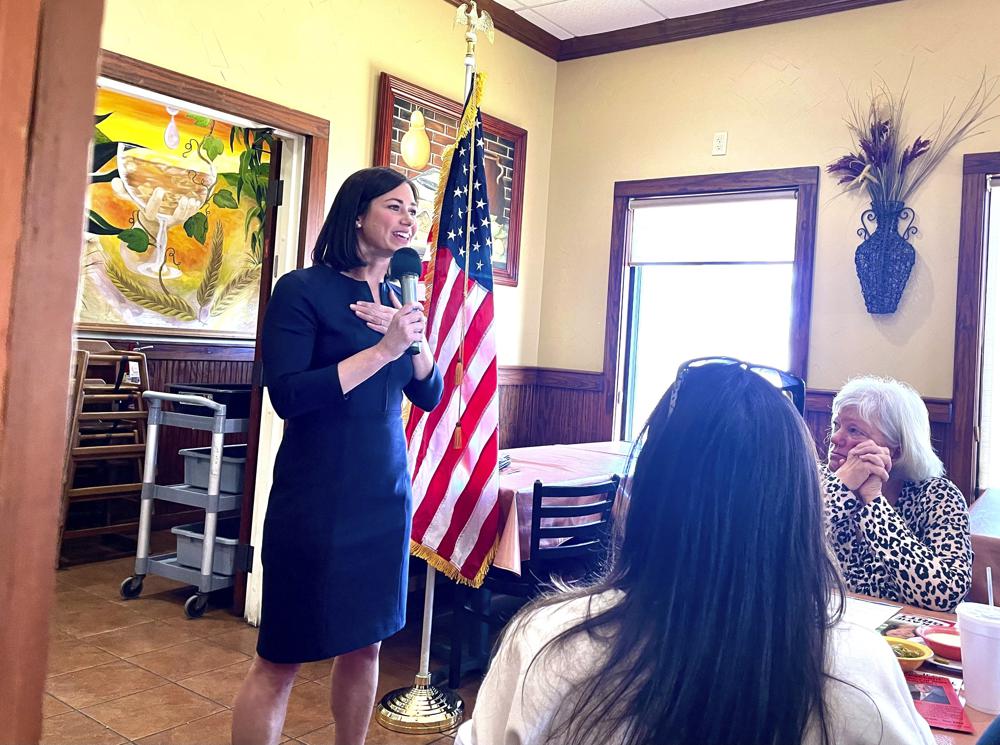
Alabama’s Republican primary for the U.S. Senate seat being vacated by retiring U.S. Sen. Richard Shelby has become a bitter high-dollar contest with the three strongest contenders jockeying for the nomination. The leading candidates are U.S. Rep. Mo Brooks, who won — and then lost — former President Donald Trump’s backing in the race; Katie Boyd Britt, the former leader of Business Council of Alabama and Shelby’s former chief of staff; and Mike Durant, an aerospace company owner best known as the helicopter pilot whose capture during a U.S. military mission in Somalia was chronicled in the “Black Hawk Down” book and subsequent movie. Lillie Boddie, Karla M. Dupriest, and Jake Schafer are also seeking the GOP nomination. Observers say it’s hard to predict whether the nomination will be settled in Tuesday’s primary. The fractured field increases the chances that the race will go to a June 21 runoff, which is required unless one candidate captures more than 50% of Tuesday’s vote. David Mowery, an Alabama-based political consultant, said the race has an up-for-grabs feel. “It’s anybody’s guess as to who’s in first and who’s in second in the runoff,” he said. As for the barrage of negative campaign ads in the primary’s closing days, Mowery said: “The gloves have come off.” The Alabama race is one of several bitterly contested GOP primaries for open Senate seats. Retirements also sparked heated races this season in Pennsylvania, North Carolina, and in Ohio. Trump further scrambled the Alabama race this spring when he rescinded his endorsement of Brooks. Both Britt and Durant have courted Trump’s nod, but he has so far stayed out of the Alabama race. “We look at this country and don’t recognize it right now. Unfortunately, under the Biden administration, every single thing in this nation is moving in the wrong direction,” Britt said during a speech to the Republican Women of East Alabama. Before leading the Business Council, Britt served as chief of staff to Shelby, one of the Senate’s most senior members and a traditional Republican known for his ability to bring home federal projects and funding to his home state. But in speeches Britt, running under a slogan of Alabama First, has leaned away from her hefty Washington resume. She said it’s important voters get to know her and the kind of senator she will be. Her experience, she said, gave her an opportunity to understand how the Senate works. “I can hit the ground running on day one. And for me, Alabama First is not just a slogan. It’s a mission,” she said. Brooks, a six-term congressman from north Alabama, is banking on his long history with Alabama voters to overcome his feud with Trump. “If you’re a conservative Republican, I would submit to you that I’m the only proven conservative in this race. With me, there is no rolling the dice to determine how I’m going to go on major public policy issues,” Brooks said, urging people to look up his ratings from the National Rifle Association, Heritage Action, and other groups. Despite losing Trump’s backing, he continues to run as “MAGA Mo,” invoking Trump’s Make America Great Again slogan, and his campaign website continues to include old video footage of Trump praising the north Alabama congressman. Trump initially endorsed Brooks last year, rewarding the conservative firebrand who whipped up a crowd of Trump supporters at the January 6, 2021 “Stop the Steal” rally that preceded the U.S. Capitol insurrection. “Today is the day that American patriots start taking down names and kicking ass,” Brooks said. But Trump withdrew the endorsement in March after their relationship soured. Trump cites Brooks’ languishing performance and accused the conservative congressman of going “woke” for saying it was time to move on from the 2020 presidential outcome and focus on upcoming elections. Brooks said Trump was trying to get him to illegally rescind the election. Trump has not made a new endorsement in the race. Both Durant and Britt have maintained they are the superior choice for Trump’s backing if the race goes to a runoff. At a speech in Phenix City, a town in the shadow of the U.S. Army’s Fort Benning, Durant pitched himself as the outsider in the race. He began a speech by describing his combat service — which included not just Somalia but Desert Storm and missions in Panama — and then working in the defense industry and founding an aerospace company. “I’m not a politician,” Durant said. “That is what people are tired of. That’s why people want outsiders. That is why people want straight shooters.” Durant said his military experience separates him from those in Washington who “don’t know what they’re talking about” when discussing deploying troops. “This is serious business. We don’t deploy troops, we don’t get in skirmishes, we don’t try to do nation-building unless we truly understand the commitment that we’re about to make, not only financially, but the lives of young men and women, our national credibility, all those things that are on the line.” Durant, a helicopter pilot who was held prisoner after being shot down, is seeking the endorsement of Trump, who once disputed that Sen. John McCain was a war hero because he was held as a POW. “I like people that weren’t captured,” Trump said in 2015. Asked about that, Durant said he thought the divisions between the two were “based on politics, not based on service.” Both Britt and Brooks have criticized Durant for “dodging debates” after his campaign declined three separate dates offered by the Alabama Republican Party. Durant said he is willing to debate but could not make it fit his schedule. Outside groups have pumped more than $20 million into the race to either support or oppose one of the frontrunners. The Super PACS have been responsible for many of the attack ads in the race. Alabama Patriots PAC spent $4 million to support Durant after receiving money from America’s Project, a Virginia-based PAC associated with Jacob Harriman,
Congress backs Joe Biden on Russia sanctions, clamors for more
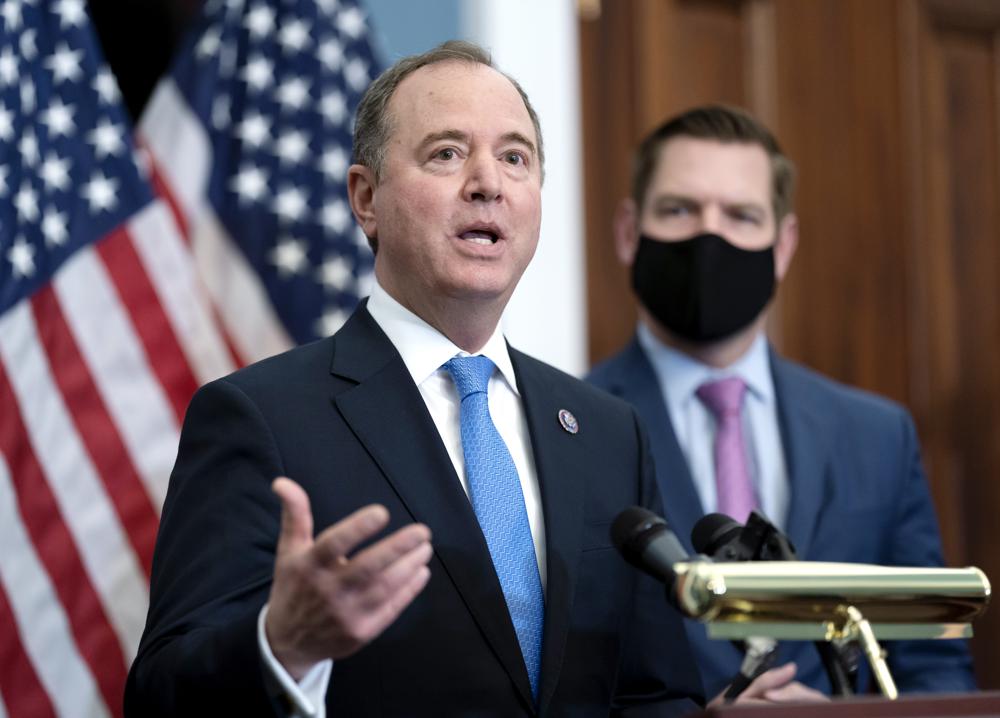
With rare but fragile alignment, the U.S. Congress is largely backing President Joe Biden’s decision to confront Russia with potentially escalating sanctions for the crisis in Ukraine as lawmakers brace for perhaps the most daunting foreign policy crisis the nation has faced in a generation. But the next steps are highly volatile. With isolationist impulses rising at home, Congress has no appetite for war. Yet Americans also appear ambivalent about the U.S. working to keep the peace. New polling from The Associated Press and NORC says just 26% of Americans want the U.S. to play a major role in the Russia-Ukraine conflict. House Speaker Nancy Pelosi said Wednesday that Russia’s aggression toward Ukraine is “an attack on democracy,” vowing that the U.S. will stand united with its allies around the world in swiftly imposing sanctions on Russia and ensuring financial and political support for an independent Ukraine. Pelosi, who returned to the Capitol from a diplomatic overseas trip, situated the aggression from Russia toward Ukraine alongside intervention in the United States’ own democratic process during the 2016 election. “There will be a price to pay for Vladimir Putin,” she said, flanked by lawmakers who had joined her delegation at the annual security conference in Munich. While Republican critics of the Biden administration — and even some Democrats — want the White House to go even tougher with swifter and more severe sanctions on Russia, most have given varying degrees of support for the White House strategy, including Biden’s move Wednesday to sanction the company building the Russia-to-Germany Nord Stream 2 gas pipeline. The top Republican on the Foreign Relations Committee, Sen. Jim Risch of Idaho, said sanctions on Nord Stream 2 are “long overdue, but I cannot overstate how critical they are to showing Putin that violating a nation’s sovereignty has consequences.” Risch, who has worked with colleagues on a bipartisan basis for years trying to end the pipeline, said: “It is good to see President Biden do the right thing.” Republican leaders have sought to steer the conversation to their preferred terms, as the party whose defense hawks once led the nation on the national security front. But it’s not at all clear whether today’s GOP can keep Republicans from tapping into an impassioned non-interventionist strain unleashed by Donald Trump’s “America First” approach. It was Trump who sought to strip protections for Ukraine from the Republican Party platform for the 2016 election and who was impeached by the House for abuse of power after he pressured the Ukrainian president to dig up dirt on Biden ahead of the 2020 campaign. This week, Trump cheered on Putin as he massed military forces near Ukraine’s border and recognized the independence of its separatist regions in a move Biden and others warned was the start of an invasion of Ukraine. As president, Trump had been critical of NATO, working to distance the U.S. from the historic partnership and berating allies to contribute more money to defense. Senate Republican leader Mitch McConnell, a longtime champion of NATO, spoke highly of the Western alliance this week, but some within his party are gravitating away from that traditional Republican position and toward Trump’s views. McConnell said he wants to see Biden impose the “toughest possible sanctions.” Other Republicans, though, most notably Sen. Josh Hawley of Missouri, a potential Republican presidential hopeful, has said the U.S. should be paying closer attention to the greater challenges he believes are posed by China. Still, most Republican senators are backing Biden’s sanctions on Putin, even if some are clamoring for more and taking political punches at Biden for seeming too tepid. Republican Sen. Lindsey Graham of South Carolina, a sometimes Trump ally who is also one of the party’s leading defense hawks and who used to globetrot with fellow GOP Sen. John McCain, invoked his late colleague this week in urging Biden to confront Putin more forcefully. Graham said Congress should impose “sanctions from hell” on Putin and his regime when lawmakers return to work next week. Sen. Ted Cruz, who had single-handedly blocked Biden’s nominees for various State Department posts to halt the Russia-to-Germany pipeline, said with the announced new sanctions, he would lift his blockade. “President Biden has now taken positive steps,” Cruz, R-Texas, said in a statement. “But much more still needs to be done to deter and counter the threat that Putin poses to our allies in Ukraine and across Europe.” Pelosi said Russians need to understand what their leader is doing. “It’s stunning to see in this day and age a tyrant roll into a country,” Pelosi said. “This is the same tyrant who attacked our democracy in 2016,” It’s unclear what more, if anything, Congress will do to confront Russia, as lawmakers hold back their own legislative response to Putin while Biden engages U.S. allies in a more global strategy. The Senate has bipartisan support for a robust sanctions package, but after running into differences over the scope and timing of the response decided to shelve a vote as the White House pursued its own approach. Graham has suggested a supplemental spending package for Ukraine, which already receives money and defensive equipment from the U.S., but it does not yet appear that additional funds are being considered. Republished with the permission of the Associated Press.
Big win for $1T infrastructure bill: Dems, GOP come together
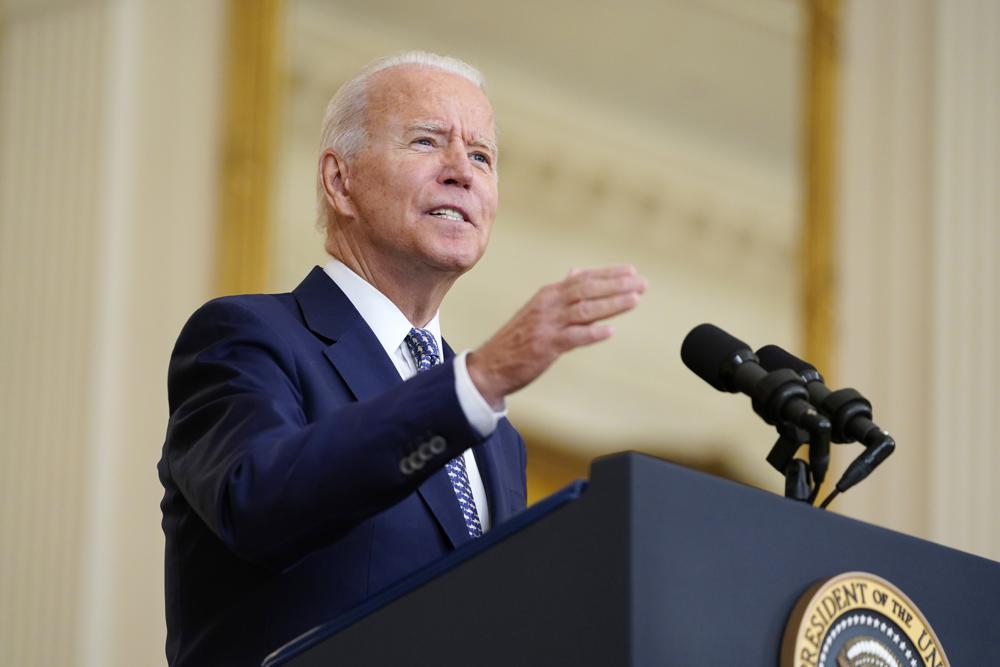
With a robust vote after weeks of fits and starts, the Senate approved a $1 trillion infrastructure plan for states coast to coast on Tuesday, as a rare coalition of Democrats and Republicans joined together to overcome skeptics and deliver a cornerstone of President Joe Biden’s agenda. “Today, we proved that democracy can still work,” Biden declared at the White House, noting that the 69-30 vote included even Senate Republican leader Mitch McConnell. “We can still come together to do big things, important things, for the American people,” Biden said. The overwhelming tally provided fresh momentum for the first phase of Biden’s “Build Back Better” priorities, now heading to the House. A sizable number of lawmakers showed they were willing to set aside partisan pressures, at least for a moment, eager to send billions to their states for rebuilding roads, broadband internet, water pipes, and the public works systems that underpin much of American life. The vote also set the stage for a much more contentious fight over Biden’s bigger $3.5 trillion package that is next up in the Senate — a more liberal undertaking of child care, elder care, and other programs that is much more partisan and expected to draw only Democratic support. That debate is expected to extend into the fall. With the Republicans lockstep against the next big package, many of them reached for the current compromise with the White House because they, too, wanted to show they could deliver and the government could function. “Today’s kind of a good news, bad news day,” said Alaska Sen. Lisa Murkowski of Alaska, one of the negotiators. “The good news is that today we really did something historic in the United States Senate; we moved out an infrastructure package, something that we have talked about doing for years.” The bad news, she said, is what’s coming next. Infrastructure was once a mainstay of lawmaking, but the weeks-long slog to strike a compromise showed how hard it has become for Congress to tackle routine legislating, even on shared priorities. Tuesday’s Infrastructure Investment and Jobs Act started with a group of 10 senators who seized on Biden’s campaign promise to draft a scaled-down version of his initial $2.3 trillion proposal, one that could more broadly appeal to both parties in the narrowly divided Congress, especially the 50-50 Senate. It swelled to a 2,700-page bill backed by the president and also business, labor, and farm interests. Over time, it drew an expansive alliance of senators and a bipartisan group in the House. In all, 19 Republicans joined all Democrats in voting for Senate passage. Vice President Kamala Harris, as presiding officer, announced the final tally. While liberal lawmakers said the package doesn’t go far enough as a down-payment on Biden’s priorities and conservatives said it is too costly and should be more fully paid for, the coalition of centrist senators was able to hold. Even broadsides from former President Donald Trump could not bring the bill down. The measure proposes nearly $550 billion in new spending over five years in addition to current federal authorizations for public works that will reach virtually every corner of the country — a potentially historic expenditure Biden has put on par with the building of the transcontinental railroad and Interstate highway system. There’s money to rebuild roads and bridges and also to shore up coastlines against climate change, protect public utility systems from cyberattacks and modernize the electric grid. Public transit gets a boost, as do airports and freight rail. Most lead drinking water pipes in America could be replaced. Sen. Rob Portman of Ohio, the lead Republican negotiator, said the work “demonstrates to the American people that we can get our act together on a bipartisan basis to get something done.” The top Democratic negotiator, Sen. Kyrsten Sinema, said rarely will a piece of legislation affect so many Americans. She gave a nod to the late fellow Arizona Sen. John McCain and said she was trying to follow his example to “reach bipartisan agreements that try to bring the country together.” Drafted during the COVID-19 crisis, the bill would provide $65 billion for broadband, a provision Sen. Susan Collins, R-Maine, negotiated because she said the coronavirus pandemic showed that such service “is no longer a luxury; it is a necessity.” States will receive money to expand broadband and make it more affordable. Despite the momentum, action slowed last weekend when Sen. Bill Hagerty, a Tennessee Republican allied with Trump, refused to speed up the process. Trump had called his one-time Japan ambassador and cheered him on, but it’s unclear if the former president’s views still carry as much sway with most senators. Trump issued fresh complaints hours before Tuesday’s vote. He had tried and failed to pass his own infrastructure bill during his time in the White House. Other Republican senators objected to the size, scope, and financing of the package, particularly concerned after the Congressional Budget Office said it would add $256 billion to deficits over the decade. Rather than pressure his colleagues, Senate Republican leader McConnell of Kentucky stayed behind the scenes for much of the bipartisan work. He allowed the voting to proceed and may benefit from enabling this package in a stroke of bipartisanship while trying to stop Biden’s next big effort. Unlike the $3.5 trillion second package, which would be paid for by higher tax rates for corporations and the wealthy, the bipartisan measure is to be funded by repurposing other money, including some COVID-19 aid. The bill’s backers argue that the budget office’s analysis was unable to take into account certain revenue streams that will help offset its costs — including from future economic growth. Senators have spent the past week processing nearly two dozen amendments, but none substantially changed the framework. The House is expected to consider both Biden infrastructure packages together, but centrist lawmakers urged Speaker Nancy Pelosi to bring the bipartisan plan forward quickly, and they raised concerns about the bigger bill in a sign of the complicated politics still ahead. After the Senate vote, she declared, “Today is a day of progress … a once in a century opportunity.”
‘Obamacare’ survives: Supreme Court dismisses big challenge

The Supreme Court, though increasingly conservative in makeup, rejected the latest major Republican-led effort to kill the national health care law known as “Obamacare” on Thursday, preserving insurance coverage for millions of Americans. The justices, by a 7-2 vote, left the entire Affordable Care Act intact in ruling that Texas, other GOP-led states, and two individuals had no right to bring their lawsuit in federal court. The Biden administration says 31 million people have health insurance because of the law, which also survived two earlier challenges in the Supreme Court. The law’s major provisions include protections for people with existing health conditions, a range of no-cost preventive services, expansion of the Medicaid program that insures lower-income people, and access to health insurance markets offering subsidized plans. “The Affordable Care Act remains the law of the land,” President Joe Biden, said, celebrating the ruling. He called for building further on the law that was enacted in 2010 when he was vice president. Also left in place is the law’s now-toothless requirement that people have health insurance or pay a penalty. Congress rendered that provision irrelevant in 2017 when it reduced the penalty to zero. The elimination of the penalty had become the hook that Texas and other GOP-led states, as well as the Trump administration, used to attack the entire law. They argued that without the mandate, a pillar of the law when it was passed, the rest of the law should fall, too. And with a Supreme Court that includes three appointees of former President Donald Trump, opponents of “Obamacare” hoped a majority of the justices would finally kill the law they have been fighting for more than a decade. But the third major attack on the law at the Supreme Court ended the way the first two did, with a majority of the court rebuffing efforts to gut the law or get rid of it altogether. Trump’s appointees — Justices Amy Coney Barrett, Neil Gorsuch, and Brett Kavanaugh — split their votes. Kavanaugh and Barrett joined the majority. Gorsuch was in dissent, signing on to an opinion from Justice Samuel Alito. Justice Stephen Breyer wrote for the court that the states and people who filed a federal lawsuit “have failed to show that they have standing to attack as unconstitutional the Act’s minimum essential coverage provision.” In dissent, Alito wrote, “Today’s decision is the third installment in our epic Affordable Care Act trilogy, and it follows the same pattern as installments one and two. In all three episodes, with the Affordable Care Act facing a serious threat, the Court has pulled off an improbable rescue.” Alito was a dissenter in the two earlier cases in 2012 and 2015, as well. Like Alito, Justice Clarence Thomas was in dissent in the two earlier cases, but he joined Thursday’s majority, writing, “Although this Court has erred twice before in cases involving the Affordable Care Act, it does not err today.” Because it dismissed the case for the plaintiff’s lack of legal standing — the ability to sue — the court didn’t actually rule on whether the individual mandate is unconstitutional now that there is no penalty for forgoing insurance. Lower courts had struck down the mandate, in rulings that were wiped away by the Supreme Court decision. With the latest ruling, the Supreme Court reaffirmed that “the Affordable Care Act is here to stay,” former President Barack Obama said, adding his support to Biden’s call to expand the law. Texas Attorney General Ken Paxton pledged to continue the fight against “Obamacare,” which he called a “massive government takeover of health care.” But it’s not clear what Republicans can do, said Larry Levitt, an executive vice president for the nonprofit Kaiser Family Foundation, which studies health care. “Democrats are in charge and they have made reinvigorating and building on the ACA a key priority,” Levitt said. “Republicans don’t seem to have much enthusiasm for continuing to try to overturn the law.” Republicans have pressed their argument to invalidate the whole law even though congressional efforts to rip out the entire law “root and branch,” in Senate GOP leader Mitch McConnell’s words, have failed. The closest they came was in July 2017 when Arizona Sen. John McCain, who died the following year, delivered a dramatic thumbs-down vote to a repeal effort by fellow Republicans. Chief Justice John Roberts said during arguments in November that it seemed the law’s foes were asking the court to do work best left to the political branches of government. The court’s decision preserves benefits that have become part of the fabric of the nation’s health care system. Polls show that the law has grown in popularity as it has endured the heaviest assault. In December 2016, just before Obama left office and Trump swept in calling the ACA a “disaster,” 46% of Americans had an unfavorable view of the law, while 43% approved, according to the Kaiser Family Foundation tracking poll. Those ratings flipped, and by February of this year, 54% had a favorable view, while disapproval had fallen to 39% in the same ongoing poll. The health law is now undergoing an expansion under Biden, who sees it as the foundation for moving the U.S. to coverage for all. His giant COVID-19 relief bill significantly increased subsidies for private health plans offered through the ACA’s insurance markets, while also dangling higher federal payments before the dozen states that have declined the law’s Medicaid expansion. About 1.2 million people have signed up with HealthCare.gov since Biden reopened enrollment amid high levels of COVID cases earlier this year. Most of the people with insurance because of the law have it through Medicaid expansion or the health insurance markets that offer subsidized private plans. But its most popular benefit is protection for people with preexisting medical conditions. They cannot be turned down for coverage on account of health problems or charged a higher premium. While those covered under employer plans already had such protections, “Obamacare” guaranteed them for people buying
University of Alabama student takes center stage in Georgia lawsuit and rally

C.J. Pearson began his career in politics at an early age after being inspired by a mock election in his Georgia elementary school. Since then, he has become a well-known political activist and the president of the Free Thinkers, a group he founded. He’s currently a freshman at the University of Alabama and was recently nominated to serve as an elector for the state of Georgia. On Wednesday, Pearson spoke at a Stop the Steal rally in Alpharetta, Georgia, led by Sidney Powell. While Powell has helped Donald Trump’s attorney Rudy Giuliani, she doesn’t work directly for Trump. According to Fox News, Powell has made several unsubstantiated claims that the presidential election was fraudulent and that Dominion’s voting machines were to blame. At a press conference Wednesday, Powell and fellow pro-Trump attorney Lin Wood told the crowd to not vote in the upcoming U.S. senate runoff on Jan. 5 in Georgia until the state changes its procedures and ends the use of Dominion voting machines. “I would encourage all Georgians to make it known that you will not vote at all until your vote is secure – and I mean that regardless of party,” Powell said. “We can’t live in a republic, a free republic, unless we know our votes are legal and secure. So we must have voter ID, and we probably must go back to paper ballots that are signed and have your thumbprint on them. We certainly should be able to find a system that can count them, even if it has to be done by hand.” Pearson tweeted a video of the rally and stated, “We are no longer the party of John McCain. We are no longer the party of Mitt Romney. We are no longer a party of cowards. We are the party of @RealDonaldTrump.” https:// We are no longer the party of John McCain. We are no longer the party of Mitt Romney. We are no longer a party of cowards. We are the party of @realDonaldTrump. pic.twitter.com/tqx6aiNgfd — CJ Pearson (@thecjpearson) December 2, 2020 Trump’s legal team, headed by Giuliani, has made several unsuccessful court challenges in several states, arguing voter fraud. Attorney General William Barr stated that the Justice Department hasn’t found widespread voter fraud that would change the outcome of the election. Pearson is named as a plaintiff in Pearson v. Kemp, a lawsuit filed in the United States District Court for the Northern District of Georgia. The lawsuit alleges voting irregularities in the presidential election. Governor Brian Kemp is named as one of the defendants. Pearson isn’t without controversy. In 2015, when he was just 13 years old, he gained notoriety for criticizing then-President Barack Obama in a highly viewed youtube video. After that, he accused Obama of blocking him on his official presidential Twitter account. Obama hadn’t blocked him, and a backlash ensued. Benji Backer, a young political activist who left the public spotlight, commented on the controversy, “I tried to give CJ advice,” Backer wrote. “And I know he’s going to lash out at me now. But we used to work together. I told him he had promise but that he had to keep it in perspective, truth [sic] and stay humble. Stardom can ruin those things and it did for him. CJ & I (when I was still in politics) were going to work on some things. But he didn’t like advice and he wanted ‘his brand’ to grow instead. People, including myself, tried to help CJ. I really thought he could do great things. But he wasn’t willing to listen. Most of all, CJ lied to me. Numerous times. And many people I know and love. That’s when I knew there was a problem.”
Donald Trump, Joe Biden debate marked by clashes, but less chaos

After the first presidential debate was panned so widely that organizers introduced a mute button, Thursday’s second and final debate between President Donald Trump and Democratic challenger Joe Biden was far more civil. Whether because of that button or the terrible reviews — especially for Trump — the two interrupted each other far less frequently, even as they clashed on issues ranging from the coronavirus to crime. Trump, in particular, was on his best behavior early, especially with the moderator, whom he’d repeatedly attacked before the debate. “So far, I respect very much the way you’re handling this,” Trump said to NBC’s Kristen Welker when she gave him time to respond to Biden at one point. Because of the pandemic, only around 200 people were seated inside the debate hall in the massive college arena in Nashville. That included a representative of the Commission on Presidential Debates, who was tasked with ensuring each candidate had a two full minutes of uninterrupted time to deliver opening answers on six major topics, according to debate commission chair Frank Fahrenkopf. And it seemed to be working, at least during the debate’s opening questions. While Trump and Biden each shook his head disapprovingly during the other’s answer about the pandemic, there was minimal interruption. And neither man tried to speak while he was muted during the opening questions. A member of each of the Trump and Biden campaigns monitored the person who controlled the mute button backstage, Fahrenkopf told The Associated Press, noting that the button would not be used beyond the first four minutes of each topic. The button was among a handful of changes implemented by the nonpartisan debate commission to help ensure a more orderly debate following the raucous and widely criticized opening debate 23 days ago. Trump was diagnosed with COVID-19 two days after the event, and he and the White House have refused to say whether he abided by commission rules and tested negative for the virus before that debate. This time, Trump was given a test aboard Air Force One en route to Nashville Thursday and tested negative, White House chief of staff Mark Meadows said. Biden’s campaign reported he also tested negative. Organizers initially planned to separate the candidates with plexiglass barriers, but removed them hours before the debate began. A Trump campaign official said the decision was made after Meadows called Anthony Fauci, the nation’s highly respected top infectious diseases expert, during a walkthrough of the venue site. Meadows them put Fauci on speakerphone, and Fauci told those in the room that all it would do was provide a false sense of security, the person said. Additionally, any audience member who refused to wear a mask would be removed, organizers said. Last month, several members of the Trump family removed their masks once seated in the debate hall, but were allowed to stay. This time, Melania Trump, who was appearing in public for the first time since her own diagnosis with the virus, was seen in her seat wearing a mask. Before the debate began, Fahrenkopf repeated the instruction to the small audience. “If you won’t leave, you’ll be escorted,” he said. Fahrenkopf said in an earlier interview that the safety measures would help reduce the risk of infection. “The Trump campaign’s attitude was that the president was not contagious anymore, but we’re going to go with our medical advisers,” he said. Indeed, the president of the university called it “the safest place in America tonight.” The primetime affair played out inside a 90,000-square-foot (8,360-square-meter) arena at Belmont University, a picturesque institution of more than 8,200 students just a mile from Nashville’s music row. The university also hosted a town hall-style debate between Democrat Barack Obama and Republican John McCain in 2008. There was a far smaller audience this time around. Only around 200 people were allowed inside, a mix of invited guests of the campaigns and the debate commission, students, the commission’s production team, security, and health and safety personnel. Audience members were seated in accordance with social distancing recommendations; several empty seats separated each person or small group. All audience members and support staff were required to undergo coronavirus testing onsite within three days of the event. They wore colored wristbands as evidence of their negative tests. There were several layers of security protecting the attendees, and dozens of protesters gathered just off campus beyond the security perimeter. One of them held a large white sign: “220,000 DEAD … Trump FAILED US.” Republished with the permission of the Associated Press.
Roberta McCain, John McCain’s mother, dies at 108
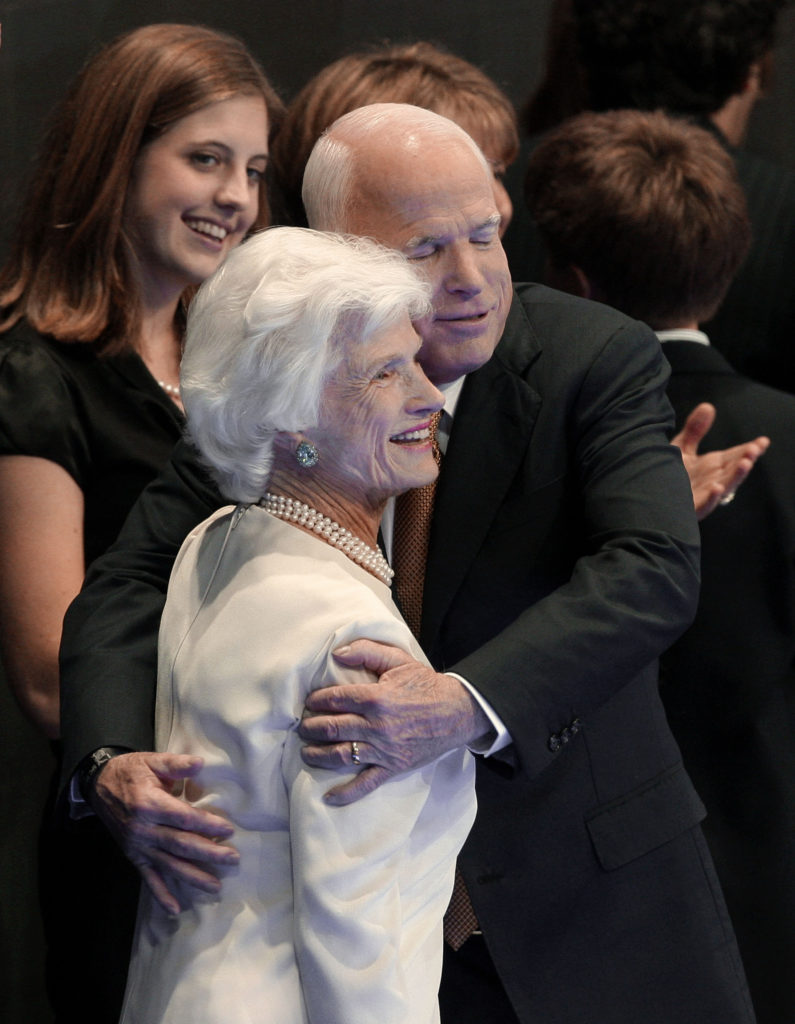
Roberta Wright McCain, the mother of the late Sen. John McCain who used her feisty spirit to help woo voters during his 2008 presidential campaign, has died. She was 108. A spokesperson for daughter-in-law Cindy McCain says Roberta McCain died Monday. A cause of death was not immediately released. “It is with great sadness that I announce the death of my wonderful Mother In-law, Roberta McCain,” Cindy McCain posted on Twitter. “I couldn’t have asked for a better role model or a better friend.” In a tweet, granddaughter Meghan McCain thanked her “Nana” for teaching her how to live life with “grit, conviction, intensity and love.” “There will never be another one like you, you will be missed every day. I wish my daughter had gotten to meet you,” said McCain, who gave birth to her first child last month. At 96, Roberta McCain became the Republican senator’s secret weapon at campaign stops as evidence that voters need not worry about her son’s age — then past 70 — as he sought the presidency. She once said her son liked to hold her up as an example of “what he hopes his lifespan will be.” In August 2018, however, it was the mother who ended up mourning the son when John McCain died of brain cancer. Despite being slowed by a stroke, Roberta McCain attended the memorial and burial services in Washington and Maryland for the middle son she called “Johnny.” She remained energetic and active into her 90s, traveling often with her identical twin sister Rowena, who died at age 99. She attended the 2008 Republican National Convention, where her son credited “her love of life, her deep interest in the world, her strength, and her belief we are all meant to use our opportunities to make ourselves useful to our country.” It was 1933 when a 20-year-old Roberta Wright defied her family and eloped with John McCain Jr. Documents released in 2008 showed that as a young ensign, John Jr. got into trouble when the couple decided to marry and he left his ship without permission. “I got married young,” she told The Muskogee Phoenix in her native Oklahoma in 2008. “I was 20 years old, and it was the best decision I ever made.” She married into a storied military family — her husband retired in 1972 with the rank of four-star admiral, the same rank held by his father, John S. “Slew” McCain Sr. Her son was later held as a prisoner-of-war in Vietnam even as his father was commander in chief of Pacific forces by the late 1960s. Roberta McCain was a young woman when her three children were born, later telling the Oklahoma paper that she was “too young and irresponsible to know you were supposed to worry about them. I just let them go. I got a kick out of watching them.” The senator said in 2008 that his “father was often at sea, and the job of raising my brother, sister, and me would fall to my mother alone.” Her other son, Joe McCain, told The Associated Press in 2007 that the family had endless dinner-table discussions about history, politics and legislation led by their mother. “We were all basically on the same side of the fence,” Joe McCain said. “But it was like Talmudic scholars arguing about a single word or an adjective in the Testament.” When Sen. John McCain wrote a memoir about his experience as a POW for nearly six years in a north Vietnamese prison, he described times when he swore in English at his Vietnamese guards, who didn’t understand. His mother later told him: “Johnny, I’m going to come over there and wash your mouth out with soap.” Meghan McCain recalled her grandmother’s strong will and sense of duty in a 2012 column for The Daily Beast website, writing that Roberta McCain did not have “a lot of patience for excuses, especially from my father when he was growing up and acting out.” “She once hit him over the head with a thermos in the back of a car because he was acting up so badly on a road trip,” Meghan McCain wrote. The McCain matriarch’s spunky personality became the stuff of stories for the family — and among those in their circle of Washington society. “Last Christmas, she wanted to drive around France. So she flew to Paris and tried to rent a car,” the senator once joked. “They said she was too old, so she bought one and drove around France.” Roberta Wright was born Feb. 7, 1912, in Muskogee, Oklahoma, where her father was a businessman whose varied, colorful enterprises included bootlegging and oil wildcatting. The family moved to Los Angeles in the mid-1920s. Her husband commanded submarines in World War II and was second in command of the cruiser St. Paul during the Korean War. He later held key posts including the Navy’s chief of congressional liaison, and died in 1981. In 1934, when a fitness report deemed him underweight, the future admiral wrote: “My wife doesn’t know how to cook, and my meals are very irregular.” Republished with the permission of the Associated Press.
Donald Trump, Joe Biden prepare to debate at a time of mounting crises

The Tuesday night debate will offer a massive platform for Trump and Biden to outline their starkly different visions for a country facing multiple crises.
For Joe Biden, long path to a potentially crucial presidency
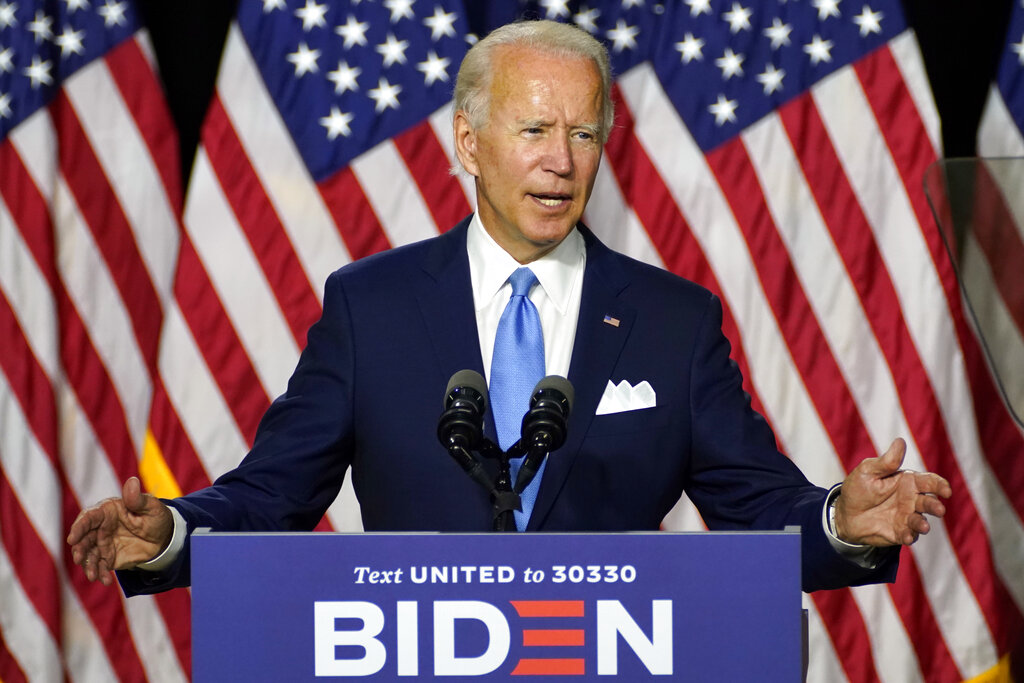
Biden has a record that mixes partisan street-fighting with bipartisan deal-making and bonhomie, and a personal journey of middle-class mores, individual struggle and family heartbreak.
Democrats make it official, nominate Joe Biden to take on Donald Trump

For Biden, who has spent more than three decades eyeing the presidency, the moment was the realization of a long-sought personal goal.

